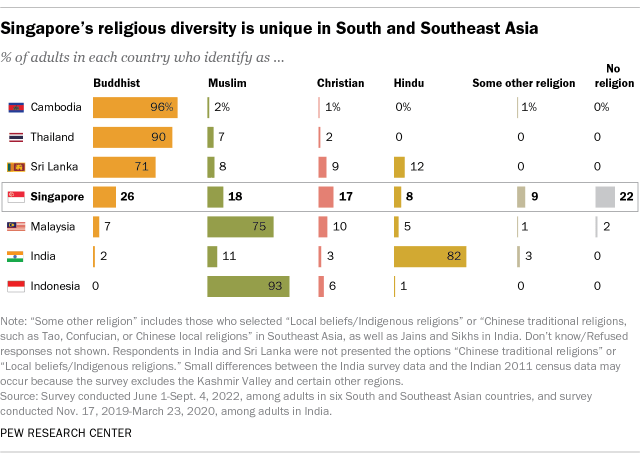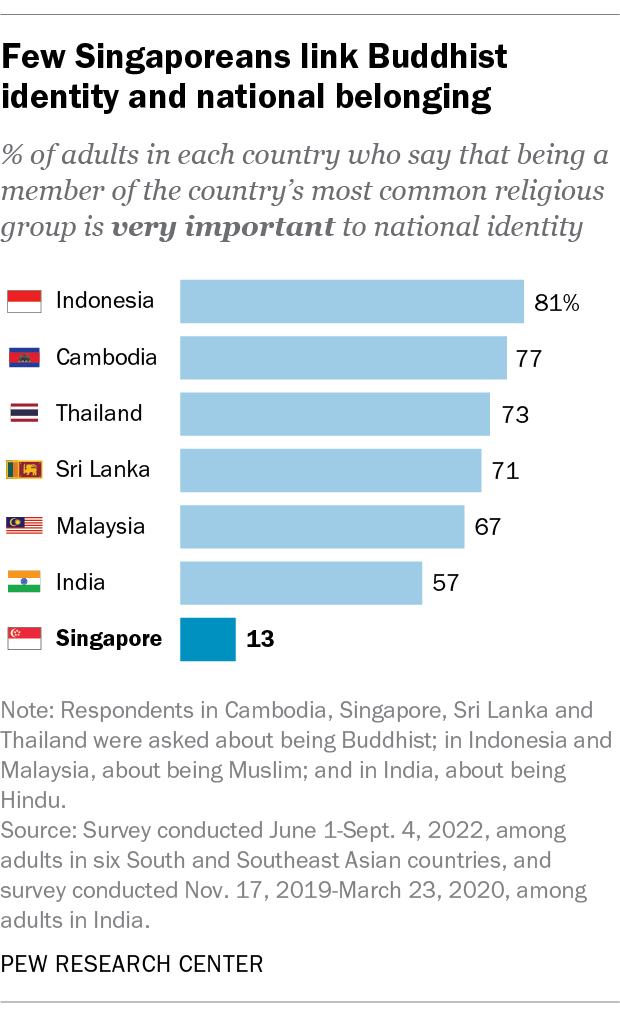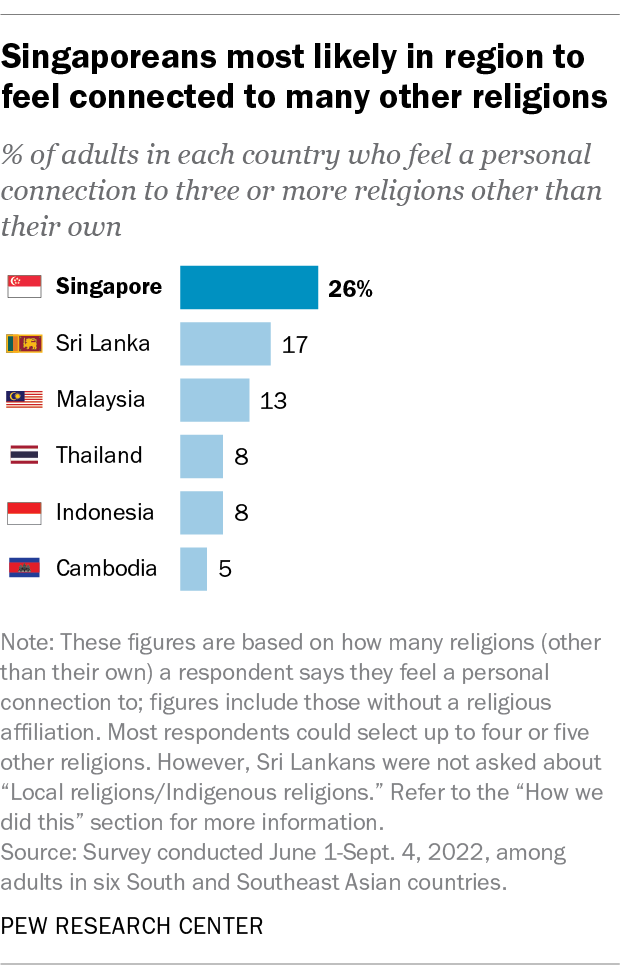In Singapore, religious diversity and tolerance go hand in hand
BY WILLIAM MINERSingapore’s religious diversity is remarkable on the global scale, and especially in comparison with its neighbors in South and Southeast Asia. Most of those countries have a single large religious majority, whereas in Singapore, no more than around a third of the population follows any one religion, according to the latest census. A 2014 Pew Research Center report even ranked Singapore as the most religiously diverse country in the world.
Singaporeans report high levels of interreligious tolerance and acceptance on multiple measures. This tolerance appears alongside a history of state-sponsored coexistence in the country. Ever since its independence in 1965, the government has staunchly pushed the idea that being multiracial and multireligious is foundational to the country.
Here are five facts about Singaporeans’ opinions on the multireligious nature of their country and their own expressions of pluralism, as compared with opinions in neighboring countries. This analysis draws from a 2022 Pew Research Center survey of more than 13,000 adults in six South and Southeast Asian countries as well as a 2019-2020 Center survey of about 30,000 adults in India.
How we did this
Many major world religions have a significant presence in Singapore. Among Singaporean adults, 26% identify as Buddhist, 18% as Muslim, 17% as Christian, 8% as Hindu, 6% as a follower of Chinese traditional religions like Taoism or Confucianism, and 4% as some other religion, including Indigenous religions. Another 22% do not identify with any religion.
Singapore’s share of people with no religious affiliation, sometimes called “nones,” is also uniquely high among the countries surveyed. Neighboring Malaysia, a federation that once included Singapore, has the next highest share of religiously unaffiliated adults at just 2%.

Singaporeans do not see being Buddhist as very important for being truly Singaporean. In contrast, most respondents in other South and Southeast Asian countries identify membership in each country’s majority religion as very important to national identity.
For example, roughly three-quarters or more of Thais, Cambodians and Indonesians say it is very important to belong to their nation’s majority religion to truly be part of their country. In Singapore, only 13% of adults say this about their country’s largest religious group, Buddhism.

Followers of all faiths in Singapore are widely pluralistic in their beliefs. Among all Singaporean adults who identify with a religion, around two-thirds (68%) say many religions can be true. Only three-in-ten say their religion is the only true religion. (Those who do not identify with a religious group were not asked this question.)

Among all Singaporean adults, six-in-ten report having a personal connection to at least one religion other than their own. Around a quarter say they feel connected to three or more other religions, the most of any country surveyed.
Many Singaporeans also revere figures from religions other than their own. At least one-quarter of Singaporean Buddhists say they pray or offer their respects to Jesus Christ (25%) or Ganesh, the Hindu god of beginnings (31%).
Even among the island’s religious “nones,” more than a third (36%) say they pray or offer their respects to Guanyin, also called the Guanyi Bodhisattva, a figure whom some Buddhists believe achieved enlightenment and aids people who are suffering.
Singaporeans of all faiths are broadly tolerant and accepting of followers of different religions. Overwhelming majorities of Singaporeans of all religions, including the religiously unaffiliated, say Islam, Christianity, Hinduism, Chinese traditional religions and Indigenous religions are compatible with Singaporean culture and values. (Singaporeans were not asked about the largest religion in the country, Buddhism.)
Singapore stood out from the other countries surveyed on this measure of tolerance. For example, 88% of Singaporean adults say that Islam is compatible with their national culture and values, compared with half of Sri Lankan adults who say the same.
Most Singaporeans also describe other religions as peaceful and say they would accept a member of those faiths as a neighbor.
Younger Singaporean adults and those with at least a college education are slightly more likely than those who are older and have lower levels of education to express these tolerant views. However, Singaporeans across all demographic groups overwhelmingly say that other religions are peaceful and compatible with their nation’s values, and they are largely willing to have members of other religions as neighbors.
Most Singaporeans view their nation’s diversity as good for the country. Overall, 56% say that having people of different religions, ethnic groups and cultures makes Singapore a better place to live. Only 4% say such diversity makes their country a worse place to live, while 37% say it makes little difference.
Highly religious Singaporeans are especially supportive of national diversity. Singaporeans who say religion is very important in their lives are more likely than Singaporeans who are less religious to say having people of many religions, ethnic groups and cultures makes their country a better place to live (65% vs. 52%).
Note: For more information on the six-country survey of South and Southeast Asia, refer to the report’s methodology section or the full survey questionnaire. For more information on the India survey, refer to the report’s methodology section and the full survey questionnaire.
Topics
Religious Identity & AffiliationInterreligious RelationsReligious Freedom & RestrictionsReligious DemographicsChristianityIslamBuddhismHinduismReligious Characteristics of Demographic Groups

William Miner is a research assistant focusing on religion at Pew Research Center..
